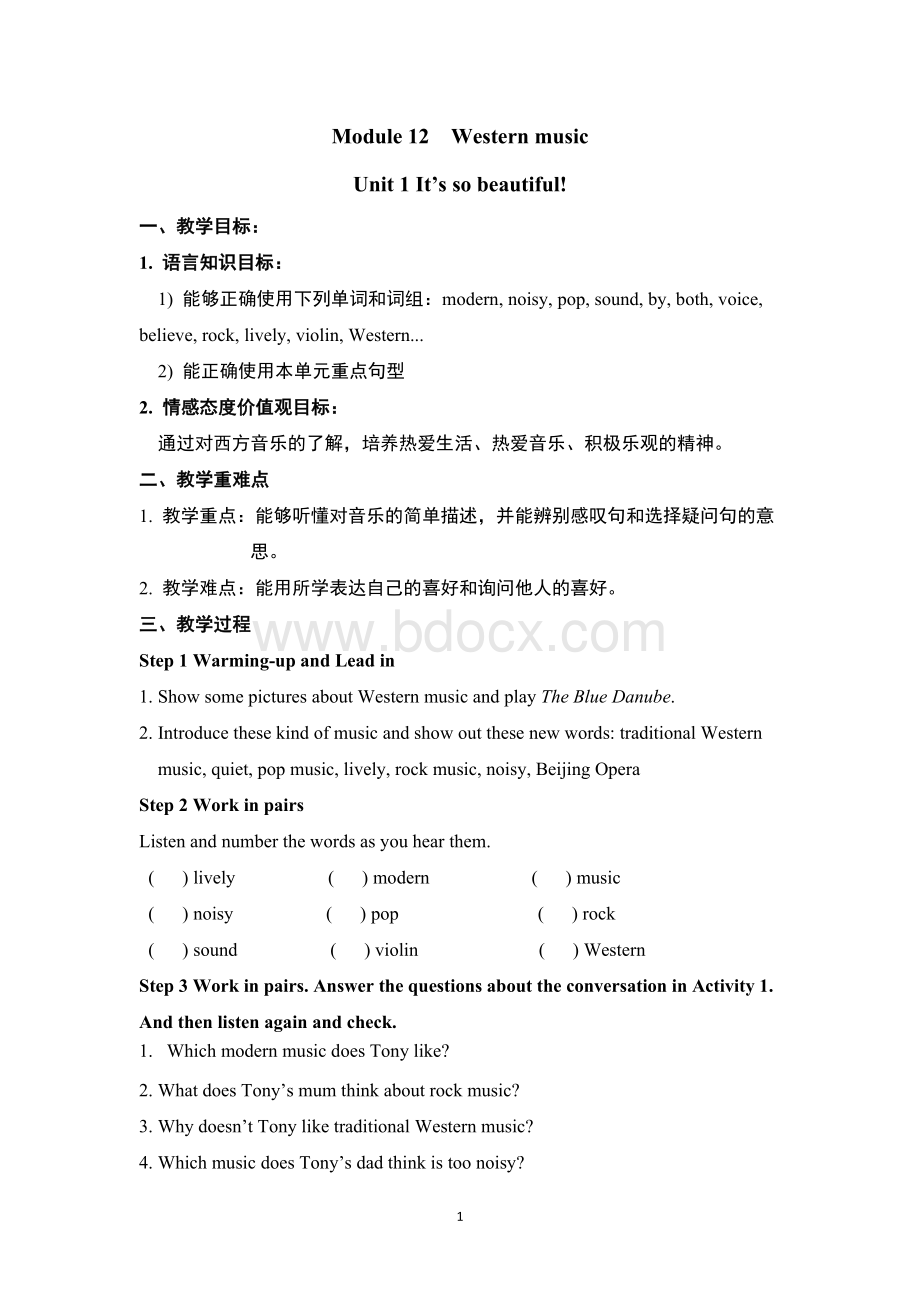 外研版英语(新标准)七年级下册Module_12_Western_music教案.doc
外研版英语(新标准)七年级下册Module_12_Western_music教案.doc
- 文档编号:30870158
- 上传时间:2024-09-12
- 格式:DOC
- 页数:14
- 大小:81.50KB
外研版英语(新标准)七年级下册Module_12_Western_music教案.doc
《外研版英语(新标准)七年级下册Module_12_Western_music教案.doc》由会员分享,可在线阅读,更多相关《外研版英语(新标准)七年级下册Module_12_Western_music教案.doc(14页珍藏版)》请在冰豆网上搜索。

Module12Westernmusic
Unit1It’ssobeautiful!
一、教学目标:
1.语言知识目标:
1)能够正确使用下列单词和词组:
modern,noisy,pop,sound,by,both,voice,
believe,rock,lively,violin,Western...
2)能正确使用本单元重点句型
2.情感态度价值观目标:
通过对西方音乐的了解,培养热爱生活、热爱音乐、积极乐观的精神。
二、教学重难点
1.教学重点:
能够听懂对音乐的简单描述,并能辨别感叹句和选择疑问句的意
思。
2.教学难点:
能用所学表达自己的喜好和询问他人的喜好。
三、教学过程
Step1Warming-upandLeadin
1.ShowsomepicturesaboutWesternmusicandplayTheBlueDanube.
2.Introducethesekindofmusicandshowoutthesenewwords:
traditionalWesternmusic,quiet,popmusic,lively,rockmusic,noisy,BeijingOpera
Step2Workinpairs
Listenandnumberthewordsasyouhearthem.
()lively()modern()music
()noisy()pop()rock
()sound()violin()Western
Step3Workinpairs.AnswerthequestionsabouttheconversationinActivity1.Andthenlistenagainandcheck.
1.WhichmodernmusicdoesTonylike?
2.WhatdoesTony’smumthinkaboutrockmusic?
3.Whydoesn’tTonyliketraditionalWesternmusic?
4.WhichmusicdoesTony’sdadthinkistoonoisy?
Step4Listenandread
1.Listenandanswerthequestion:
(1)Whatisthenameofthefirstpieceofmusic?
(2)DoesDaminglikerockmusic?
2.ReadandfinishtheexercisesofActivity4.
1)They’relisteningtoWesternmusic.
2)TonyknowslittleaboutStrauss.
3)StrausswasborninthecapitalofAustralia.
4)TheBlueDanubeispopmusic.
5)LinglingenjoysBeijingoperaverymuch.
3.Askstudentstoreadthedialogueandtrytofindoutsomeimportantsentencesbythemselves:
(1)...thisisWesternmusic,isn’tit?
(2)It’ssobeautiful!
(3)IsthisbyStraussorMozart?
(4)Whatabeautifulcity!
(5)Youlistentopopmusic,Lingling,don’tyou?
4.Afterthereading,havethestudentsfinishActivity5.
believebothdrumGermannoisyvoice
1)Strausswasn’t______.HecamefromAustria.
2)Damingthinksthe______inrockmusicaretoo______.
3)Tonycan’t______thatDamingdoesn’tlikerockmusic.
4)Bettylikes______traditionalWesternmusicandpopmusic.
5)Tonythinksthesoundofthe______inBeijingOperaisverydifferent.
Step5TostudyEverydayEnglish.
¤Whatabeautifulcity!
¤I’mafanofrockmusic.
¤Giveusabreak!
¤Idon’tbelieveit!
Step6Completethesentencesaboutyourself.
1.Myfavouritemusicis…
2.Ilikeitbecause...
3.Myparentslike...
Step7Speaking
1.Listenandread.
1)Whatabeautifulcity!
2)It’ssobeautiful!
3)Ilovehismusic!
4)Listentothis!
2.Workinpairs.Askandanswerthequestionsaboutthemusicyoulikeordon’tlike.
—Whatmusicdoyoulike?
—Ilikepop.It’slivelyandgoodtodanceto,butIdon’tlikerock.It’stoonoisy.Whataboutyou?
Step8LanguagePoints
1.ItgoesthroughVienna.
through意为“穿过,经过”,常与pass,go,walk等动词连用。
eg.Wewalkedrapidlythroughthebackdoor.
我们快速走过后门。
across,through,over三者都有“通过,穿过”之意。
区别是:
1)across表示从一定范围的一边到另一边,与on有关,表示动作是在某一物体的表面进行的。
Theywalkacrosstheroad.他们穿过公路。
2)through表示从中间通过,强调动作是在里面进行的。
Wewalkthroughtheforest.我们穿过森林。
3)over多指空间范围上通过,越过或垂直在上,和表面不接触等。
Thebirdsflyoverthecity.鸟儿飞过城市。
2.It’ssonoisy!
Noisy意为“吵闹的”
e.g.Thiscityisnotquiet,it’snoisy.这个城市不安静,很吵闹。
3.Hmm,thisisWesternmusic,isn’tit?
Youlistentopopmusic,Lingling,don’tyou?
Hmm,thesoundisvery…different,isn’tit?
以上这些句子中都包含一个反义疑问句。
反意疑问句
1.含义
在一个陈述句之后附上一个简短的疑问句,对陈述句提出相反的疑问,这种疑问句叫反意疑问句。
如:
1)Lionsarescary,aren’tthey?
2)WespeakChinese,don’twe?
2.结构:
结构一:
前肯+后否
eg.Lionsarescary,aren’tthey?
狮子很恐怖,不是吗?
结构二:
前否+后肯
eg.Lionsaren’tscary,arethey?
狮子不恐怖,对吧?
【牛刀小试】
前肯+后否
be动词:
1.Youareanactor,__________?
2.Heisagoodboy,________?
3.Itwasfineyesterday,_________?
行为动词:
1.Itoftenrainshere,_________?
2.Helikessoccer,_________?
3.Youhaveaheadache,_________?
4.Icalledyouyesterday,_______?
前否+后肯
1.Youaren’tanactor,_________?
2.Heisn’tagoodboy,________?
3.Itwasn’tfineyesterday,________?
4.Itdoesn’trainhere,__________?
5.Hissisterdoesn’thaveaheadache,_________?
6.Youdidn’tcallmeyesterday,___________?
Step9Exercises
一、完成下列反意疑问句。
1.HeisinClassOne,_______?
2.Youdon’tspeakEnglish,_______?
3.TheyhavebeentoChina,___________?
4.Youruncledidn’treturnyesterday,______?
5.Therearetenpandasinthezoo,___________?
6.Youwon’tgotoUSA,_________?
7.Thereisn’taboyinourclassroom,_________?
8.Thereweren’tmanycarsinthestreet,___________?
9.Don’tsmoke,__________?
10.Let’snotdoit,_________?
Keys:
1.isn’the2.doyou3.haven’tthey4.didhe5.aren’tthere
6.willyou7.isthere8.werethere9.willyou10.shallwe
二、根据汉语完成句子。
1.谁是你最喜欢的古典音乐家?
__________________________________
2.萨莉不喜欢流行音乐,是吗?
__________________________________
3.让我们休息一下。
______________
4.你喜欢传统西方音乐还是流行音乐?
__________________________________________________
5.哪条河穿过上海?
_______________________________
6.你不喜欢摇滚乐?
我不信。
___________________________________________
Keys:
1.Who’syourfavouriteclassicalmusician?
2.Sallydoesn’tlikepopmusic,doesshe?
3.Giveusabreak.
4.DoyouliketraditionalWesternmusicorpopmusic?
5.WhichrivergoesthroughShanghai?
6.Youdon’tlikerockmusic?
Idon’tbelieveit!
Step10Homework
ReviewandrecitetheimportantpointsofUnit1.
Unit2ViennaisthecentreofEuropeanclassicalmusic.
一、教学目标:
1.语言知识目标:
1)能够正确使用下列单词和词组:
centre,European,classical,century,composer,poor,another,poor,perfect...
2)理解文章内容,获得重要信息,提高阅读能力
2.情感态度价值观目标:
了解外国伟大音乐大师和西方音乐的不同文化,培养学生热爱生活、热爱音乐、积极乐观的精神。
二、教学重难点
1.教学重点:
能够掌握人物介绍的基本写作方法,写出简单的人物介绍。
2.教学难点:
能读懂有关音乐以及人物介绍的文章,掌握其细节内容。
三、教学过程
Step1Warming-upandLeadin
TogivethestudentssomepicturesandvideosaboutStraussWaltz.LetthemwatchandthentalkaboutWesternmusic.
Step2Workinpairs.
LookatthepicturesofActivity1anddescribeit.Usethewordsfromtheboxtohelpthestudents.
Step3Reading
1.Scanning
Askthestudentstoscanthepassageandanswerthequestionsasquicklyastheycan.
Howmanycomposersarementionedinthepassage?
Whoarethey?
2.Listening
AskthestudentstolistentothetapeanddotheexercisesofActivity2.
1)ManymusicianscametostudyandworkinVienna.
2)Strausstheyoungerplayedthepiano,theviolinandthedrumsattheageofsix.
3)Mozart’sfamilytookhimaroundEurope.
4)Thefather,JohannStrauss,diedin1791.
5)MozartwroteTheBlueDanube.
3.Carefulreading
Askthestudentstoreadtheparagraphandanswerthequestions:
1)WhereisVienna?
2)WhatmusicdidJohannStrausstheelderwrite?
3)HowmanywaltzesdidJohannStrausstheyoungerwrite?
4)WhenwasMozartborn?
5)HowoldwasMozartwhenhedied?
4.CompletethepassageofActivity4withthecorrectformofthewordsfromthebox.
anotherelderEuropeanperfectpoorpopular
BothStraussthe
(1)______andStrausstheyoungerwrotesomevery
(2)_______music.(3)_______successfulcomposerfromViennawasMozart,buthebecamevery(4)______anddiedattheageofthirty-five.ManypeoplethinkMozart’smusicis(5)_______.Allthreeweregreat(6)_________musicians.
Step4Writing
UsethenotetowriteapassageabouttheChinesecomposerXianXinghai.
¤XianXinghai
¤famousforthesongTheYellowRiver
¤wroteitin1939
¤oneofthegreatcomposersofclassicalandtraditionalmusic
¤borninMacao,China,1905
¤diedyoung,1945
¤calledthe“People’sMusician”
¤usedtraditionalChinesemusic
¤studiedinParis
¤songsarestillpopulartoday
Theycanwritelikethis:
XianXinghaiisoneofthegreatcomposersofclassicalandtraditionalmusic.Hewasbornin...
Step5LanguagePoints
1.HisdancemusicmadehimfamousalloverEurope.
1)make的常见用法:
①makesb.dosth.使某人做某事
makesb.notdosth.使某人不做某事
eg.Parentsalwaysmaketheirchildrenlearnmanythings.
父母总是使他们的孩子学习很多东西。
②makesb./sth.+adj.使某人/物……
eg.Thebadnewsmadehimverysad.这个坏消息使他很伤心。
2)allover遍及
allovertheworld全世界
alloverthecountry全国
alloverChina全中国
eg.Wehavefriendsallovertheworld.我们的朋友遍天下。
2.…heplayednotonlythepiano,butalsotheviolin.
notonly…butalso…是一个表并列关系的连词,用来连接两个并列关系的句子成分。
eg.IcanspeaknotonlyEnglish,butalsoFrench.
我不但会讲英语,而且还会讲法语。
Step6Exercises
一、用所给动词的适当形式填空。
1.Tony___________(notlike)popmusic,doeshe?
2.Ilikepop.It’slivelyandgood________(dance)to.
3.Thereweretwocomposers_____(call)JohannStrauss.
4.Mozart_______(die)in1791whenhewasonly35.
5.He_____(be)ateacherin1992.
keys;1.doesn’tlike2.todance3.called4.died5.was
二、按要求转换下列句子。
1.Attheageof20,hejoinedthearmy.(改为同义句)
____________20,hejoinedthearmy.
2.Yourfatherwasbornin1948,__________?
(完成反意疑问句)
3.Strausswasfamousforhiswaltzes.(改为同义句)
Strauss’waltzes________________.
4.Icanplaytheviolin.Tomcanplaytheviolin,too.(改写为同义句)
________I________Tomcanplaytheviolin.
5.ManypeoplewenttoQingdaotoenjoythebeautifulsea.(就画线部分提问)
_________manypeople____toenjoythebeautifulsea?
Keys:
1.Whenhewas2.wasn’the3.madehimfamous4.Notonly;butalso5.Wheredid;go
Step7Homework
ReviewandrecitetheimportantpointsofUnit2.
Unit3Languageinuse
一、教学目标:
1.语言知识目标:
1)掌握本模块所学单词和短语
2)收集相关信息,恰当运用所学短语和句型向他人介绍中国音乐。
2.情感态度价值观目标:
了解维也纳音乐会,使学生感受音乐的美好,激发学生热爱生活。
二、教学重难点
正确运用选择疑问句和祈使句
三、教学过程
Step1WarmingupandLeadin
To
- 配套讲稿:
如PPT文件的首页显示word图标,表示该PPT已包含配套word讲稿。双击word图标可打开word文档。
- 特殊限制:
部分文档作品中含有的国旗、国徽等图片,仅作为作品整体效果示例展示,禁止商用。设计者仅对作品中独创性部分享有著作权。
- 关 键 词:
- 外研版 英语 新标准 年级 下册 Module_12_Western_music 教案
 冰豆网所有资源均是用户自行上传分享,仅供网友学习交流,未经上传用户书面授权,请勿作他用。
冰豆网所有资源均是用户自行上传分享,仅供网友学习交流,未经上传用户书面授权,请勿作他用。


 党组织、党员联系服务师生工作制度.docx
党组织、党员联系服务师生工作制度.docx
 物流与供应链管理 第七章 供应链综合计划.pptx
物流与供应链管理 第七章 供应链综合计划.pptx
 回弹仪检测多孔砖砖强度计算表.xls
回弹仪检测多孔砖砖强度计算表.xls
